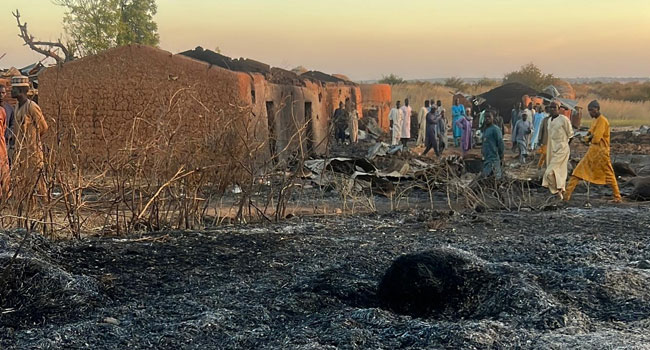Governor of Abia State, Alex Otti, has called for the immediate establishment of State Police as a critical step in addressing Nigeria’s security challenges.
Represented by his Deputy, Ikechukwu Emetu, Otti made this position clear at the South East Zonal Constitution Review session for Abia and Imo States, which took place in Owerri under the auspices of the House of Representatives’ Special Ad-hoc Committee on Constitution Review.
Emphasizing the need for decentralizing policing powers, Otti stated, “The current exclusive federal policing system is largely inadequate and has exposed our people to a litany of vulnerabilities over the years. So, I would vote for the creation of State Police but with a proviso that standards be clearly defined as it relates to leadership, relationship with federal and other sub-national policing structures, recruitments, accountability and respect for human rights.”
In the area of political representation, the Governor declared his full backing for the creation of additional legislative seats for women at both national and state levels. However, he stressed the need for reforms within political parties to ensure the genuine inclusion of women, rather than symbolic appointments. “The internal processes within the political parties have to be strengthened to make for the active participation of women in decision making. The ordinary women, not persons related or affiliated to powerful male party leaders, must be at the centre of the process,” he said.
He further cautioned that without structural changes, the initiative might only reinforce existing power dynamics. “If we are not careful, we may be creating new openings for men with vested interests to further entrench themselves in the system using proxies. If that happens, nothing in the real sense of it would change in the political fortunes of average Nigerian women,” Otti added.
Commenting on the move to recognize Local Governments as a distinct tier of government in the Constitution, Otti urged caution. He noted the broader implications, especially the strain on national resources and the risk of inflating an already overburdened bureaucracy. “My first interest is the clamour for the creation of additional States. I am aware that proposals for the creation of 31 new States were received by the National Assembly prior to this time.”
“While I respect the rights of those who believe that the creation of new States would address concerns of marginalisation and exclusion of some ethnic and religious groups in the current structure in some parts of the country. I am more concerned about the additional burden these proposals, if adopted, would add to the lean resources of the nation through the multiplication of administrative costs and further bloating of an oversized bureaucracy. Except we can magically find independent sources of financing the new states outside what currently exists, I do not share the optimism of those promoting the idea of adding new states to the current 36-state structure.
“My recommendation would be the development of an inclusive governance model in the States, one that gives every major clan a say in the allocation of resources, a seat at the decision-making table and the structural leverage to advance their political and economic interests.”
The Governor also raised concern over the fiscal prudence of creating autonomous Local Government administrations. “Like I argued with the creation of additional States, we must be mindful of further bloating an already-overfed bureaucracy. I may not be very correct, but if I understand this proposal correctly, we may be looking at creating hundreds of new bureaucratic structures for the autonomous administration of the local councils.”
He noted the critical role of Local Governments in providing essential services and questioned the feasibility of such administrative expansion. “The Local Government system, as we know, is statutorily responsible for the provision of primary healthcare; basic, adult and vocational education, and similar functions that impact directly on the lives of the population at the grassroots.”
“Like I asked at the 18th Community of Practice Meeting of the Honourable Commissioners of Budget and Economic Planning in Umuahia last May, would it be financially prudent to have 774 or more universal basic education commissions and a similar number of agencies managing primary health and human services for LGAs in the country? What are the implications for the cost of governance, corruption, and systemic abuses?”
He urged policymakers to focus on optimizing public service delivery rather than expanding bureaucracy. “There may be need to think this through and make a choice between having new layers of administrative structures that further drain public resources through inflated overheads and creating a system that cuts down bureaucratic bottlenecks — guaranteeing that the larger chunk of public resources is channelled into the provision of social services.”
In addressing economic priorities, Otti underscored the importance of job creation, particularly outside the civil service, and elevating the welfare of everyday Nigerians. According to him, the current system is “too elite-driven to be functional,” and he called for the common man to be placed at the heart of governance decisions.
He also lent his support to the proposal making free and compulsory basic education a fundamental right of all citizens. “The proposal aligns perfectly with the 1948 Universal Declaration of Human Rights; the 1989 International Convention on Economic, Social and Cultural Rights; the 1989 Convention on the Rights of the Child; the 1981 African Charter on Human and Peoples’ Rights and the 1990 African Charter on the Rights and Welfare of the Child amongst other international conventions and agreements.”
However, Otti stressed that legal guarantees must be matched with adequate funding and teacher empowerment. “Beyond just making the right to basic education a fundamental right for our people and enshrining the same in the Constitution, I think we need to pay more attention to education financing. Quality education does not come cheap, and it is not just enough to ask everyone to go to school. Deliberate efforts must be made to fund education across the entire value chain.”
“We need to invest in teacher education with particular emphasis on training and retraining, especially in the relevant fields of sciences, technology, engineering, and mathematics. Our teachers must be trained and motivated to acquire relevant skills to be able to teach the pupils and students effectively and prepare them for the competition of the new global environment.”
“These teachers have to be well remunerated, their welfare prioritised, and the environment where they work made conducive for the very important work that they do. So, in addition to making education compulsory and a fundamental right of citizens, we also have to make effective provisions for the statutory funding of the educational system, especially basic education.”
Otti concluded his address by urging pragmatism in the constitutional review process. “Our target should not be to create a perfect constitution. While perfection would be the ideal thing to aspire to, the truth remains that we will do better by focusing on what is practical within the context of our democratic evolution, economic realities and social dynamics. What I think we should rather seek at this point is to build on the gains that have been made over the past 26 years since the present Constitution came into effect.”
He acknowledged gaps and ambiguities in the 1999 Constitution, stressing the need for ongoing reforms. “Even then, I am also cautious when blaming those who left the scene almost 30 years ago for the problems of today. My view is that we now have sufficient governance experience to determine what is not working and make changes as may be relevant from time to time.”
“I am aware that since 2010, the 1999 Constitution has undergone 5 epochs of alterations in response to demands for structural changes by Nigerians. Going through the whole 9 yards of constitution amendment at 5 times over a 15-year period speaks to our evolving desire to change our national experience by periodically tinkering with the Supreme Laws of the land. We must congratulate ourselves for not being afraid to test the system and brave the odds to make some much-needed changes.”











